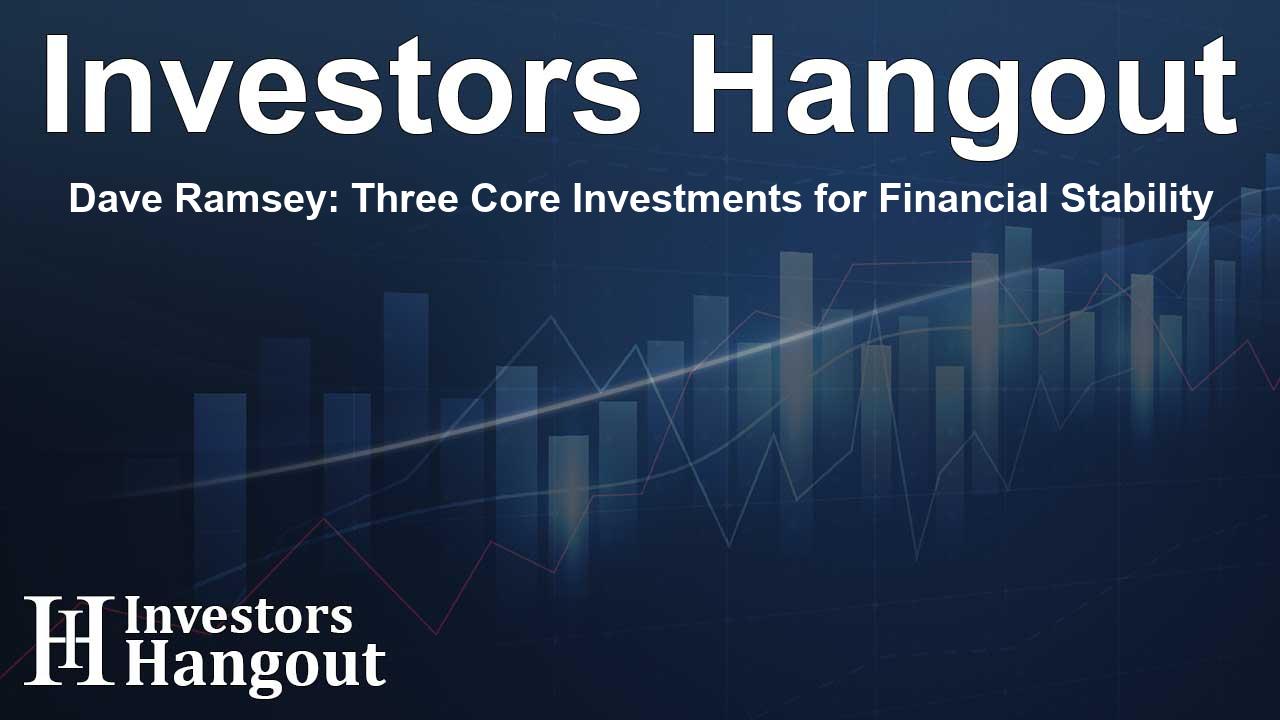Dave Ramsey: Three Core Investments for Financial Stability

Understanding Dave Ramsey's Investment Philosophy
Personal finance expert Dave Ramsey has always been straightforward about his views on investment strategies. He often critiques the allure of cryptocurrencies, gold, and single-stock investing, asserting that these options can divert attention from more stable financial strategies. Interestingly, some recent analyses suggest that his preference for mutual funds might not yield the best possible returns compared to other investment approaches.
Ramsey's Investment Strategy
The Three Investments
In a recent video, Ramsey famously declared, "I have three investments — that's all I have: my business, paid-for real estate and mutual funds. I don't play single stocks. I don't screw around with gold. I don't mess with Bitcoin." This statement encapsulates his philosophy of prioritizing stability and avoiding speculative assets.
Avoiding Speculation
Ramsey has consistently advised against speculative investments. He often ridicules those who offer stock tips without having proven success. In one of his videos, he quipped, "I don’t need your stock tip from your broke golfing buddy. I’ll set my net worth down beside yours while you mouth off." His track record supports his stance on focusing on reliable investments.
Analyzing Investment Performance
Comparative Studies on Ramsey's Approach
In a recent consult with Brian Preston and Bo Hanson from The Money Guy Show on YouTube, they examined the long-term performance of Ramsey's favored investment strategies. By constructing a 'Ramsey portfolio' with mutual funds similar to his preferences, they aimed to gauge its efficacy against popular market strategies.
They selected several funds, including Columbia Large Cap Index Fund (NASDAQ: NEIAX), JPMorgan Mid Cap Growth Fund (NASDAQ: JMGPX), American Funds EuroPacific (NASDAQ: REREX), and Franklin Small Cap Growth Fund (NASDAQ: FSGRX). They then compared its results with the Vanguard S&P 500 ETF (NYSE: VOO) and a balanced three-fund portfolio.
Performance Outcomes
Here’s how Ramsey’s portfolio compared:
| Time Period | Ramsey Portfolio | S&P 500 (VOO) | Three-Fund Portfolio |
|---|---|---|---|
| 10 years | ~8% | ~12% | ~9% |
| 5 years | ~10% | ~15% | ~12% |
These observations highlighted that while Ramsey's growth-heavy asset allocation might have excelled during market upswings in the past, it currently struggles against mainstream index funds, especially those reflecting the S&P 500.
Ramsey's Stance on Crypto and Gold
The Negative Comparison
Despite fluctuating market trends, Ramsey has remained steadfastly critical of speculative assets. During a particularly robust crypto market in 2021, where Bitcoin (CRYPTO: BTC) experienced significant gains, he likened investing in cryptocurrencies to gambling, suggesting that making money off them doesn't equate to wise investing practices.
He further expressed, "People can make a lot of money on cocaine too; just because it can seem lucrative doesn’t mean it’s wise or safe. Stick to long-term mutual funds." As of the latest updates, Bitcoin's valuation fluctuates around $124,648.
Challenging the Real Estate Narrative
In discussions about real estate investment, Ramsey debated the notion of passive income. He asserted that effective real estate investments require active involvement and vigilance, as neglect often leads to losses. He stated, "There's nothing passive about it — you're either in the middle of it or you're getting screwed." This reflects his commitment to involvement in one’s investment choices, emphasizing the necessity of due diligence and engagement in asset management.
Final Thoughts on Personal Finance
Ramsey’s three-pronged investment strategy prioritizes stability over speculative ventures. By focusing on mutual funds, real estate, and business investments, he advocates for a disciplined, consistent approach to financial growth. While his views may not align with the trends in cryptocurrency or gold, they serve as a reminder to consider long-term implications over short-term gains when planning investments.
Frequently Asked Questions
1. What are Dave Ramsey's main investment recommendations?
Dave Ramsey recommends focusing on three areas: mutual funds, paid-for real estate, and owning a business, avoiding speculation.
2. How does Ramsey view cryptocurrencies?
He regards cryptocurrencies like Bitcoin as speculative assets that can lead to financial ruin, advocating for traditional investments instead.
3. What is the performance comparison of Ramsey’s portfolio?
Studies show Ramsey's portfolio performing lower than the S&P 500 and balanced fund approaches over the past decade.
4. Does Ramsey believe in passive income through real estate?
No, he challenges the idea of passive income in real estate, emphasizing the need for active management to prevent losses.
5. What funds does Ramsey prefer for his investment strategy?
He favors mutual funds, particularly large-cap index funds and growth funds, to implement his investment strategies effectively.
About The Author
Contact Olivia Taylor privately here. Or send an email with ATTN: Olivia Taylor as the subject to contact@investorshangout.com.
About Investors Hangout
Investors Hangout is a leading online stock forum for financial discussion and learning, offering a wide range of free tools and resources. It draws in traders of all levels, who exchange market knowledge, investigate trading tactics, and keep an eye on industry developments in real time. Featuring financial articles, stock message boards, quotes, charts, company profiles, and live news updates. Through cooperative learning and a wealth of informational resources, it helps users from novices creating their first portfolios to experts honing their techniques. Join Investors Hangout today: https://investorshangout.com/
The content of this article is based on factual, publicly available information and does not represent legal, financial, or investment advice. Investors Hangout does not offer financial advice, and the author is not a licensed financial advisor. Consult a qualified advisor before making any financial or investment decisions based on this article. This article should not be considered advice to purchase, sell, or hold any securities or other investments. If any of the material provided here is inaccurate, please contact us for corrections.
